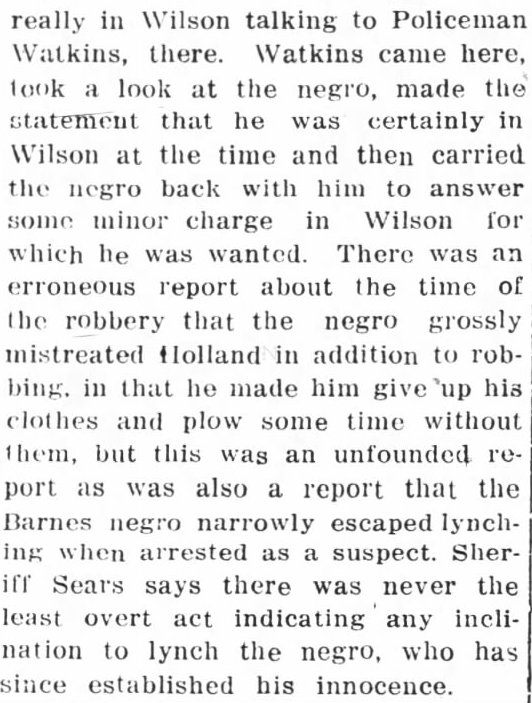
Wilson Daily Times, 1 February 1914.
A January 31 News & Observer article tells the fuller background story. J.D. Holland of Wake County was out plowing a field near his house when he was robbed at gunpoint of his knife, a gold watch, and one dollar. “Mr. Holland was taken unawares by the negro and at the point of a pistol was first forced to give up his property and then take off all his clothes and plough several furroughs of land. The robbery was not at all welcomed by Mr. Holland, but the work of imitating Adam was very disagreeable to the Wake farmer.” This humiliation was equally disagreeable to Holland’s neighbors, who quickly formed an armed posse to hunt for a Black man “of yellow complexion, weighing about 160 pounds and wearing a slightly dark moustache.” They made one false capture before encountering Tip Barnes walking on railroad tracks near Millbrook and locking him in a store.
When the sheriff arrived, he found a “small crowd of citizens” gathered, who “merely wanted to see that the negro was placed behind bars.” Barnes, however, claimed a hundred armed people milled about all night, hollering “Lynch him!” Barnes further claimed that he could not be the culprit, as he had only arrived in Raleigh the previous morning, having skipped town when he and another man got in some trouble in Wilson. Though the reporter expressed doubt, as reported above, Barnes did in fact have an airtight alibi. He was in Wilson at the time of the robbery, being questioned by Wilson police about a completely different crime.
The news bureau took care to debunk two rumors, perhaps in the interests of lowering public temperature. First, it urged, the robber had not humiliated Holland by forcing him to strip naked and continue plowing. Nor was it true that Barnes “had narrowly escaped lynching” at the time of his arrest.
Tip Barnes, who was well-known to law enforcement, escaped imprisonment (false or otherwise) in this instance. Eight years later, however, he was convicted of the murder of his wife, India Barnes, in Wilson.
